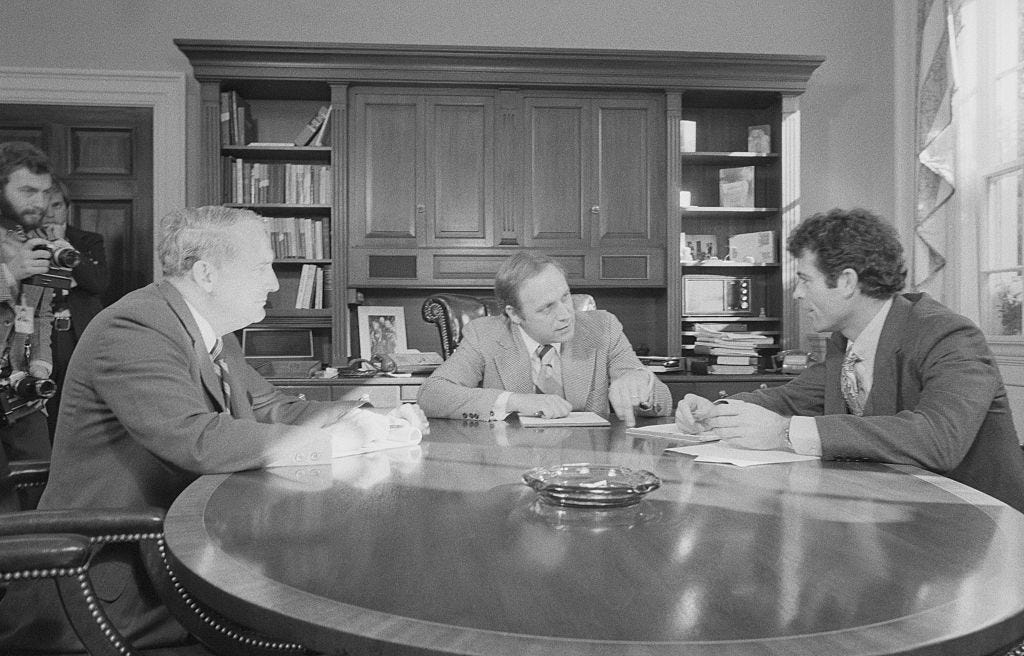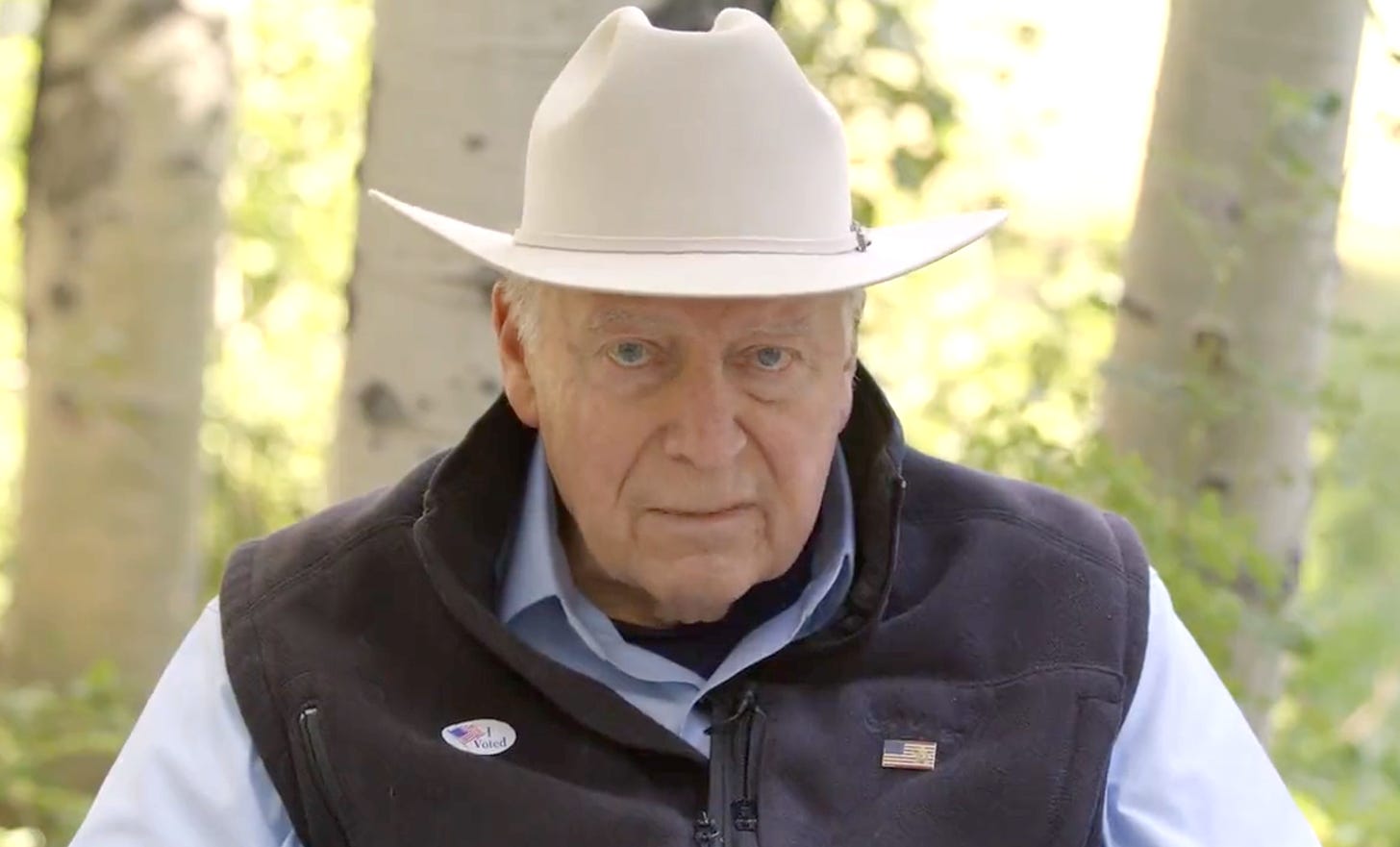
Dick Cheney has always been young, and always been old. This post is meant to connect his latest public message, in a powerful, blunt minute-long video on behalf of his daughter Liz Cheney and strongly against Donald Trump, to the anomalous young-but-old place he has had in modern public life.
It is not an attempt to recap his very well-known official record. For that there are books, movies, our collective memory.
Doing everything, early.
After his wastrel early years—wastrel by all accounts, including his own—Cheney became that familiar political type, the sharp young staff assistant. In his mid 20s he was an aide to a Republican governor of Wisconsin. At 28 he worked briefly on a Republican Congressional staff, and soon became an aide to the also-precocious Donald Rumsfeld, then in his 30s and head of Richard Nixon’s Office of Economic Opportunity.
(Rumsfeld of course exemplifies timescale anomaly, having been both the youngest and the oldest Secretary of Defense in U.S. history. Jerry Brown holds a similar distinction among California governors, as the second-youngest and also the oldest ever.)

At age 30 Cheney was a staffer in Richard Nixon’s White House. By age 34, he was Gerald Ford’s White House chief of staff, succeeding — wait for it — Donald Rumsfeld.
There’s a long series of other “young” steps for Cheney—notably five terms in Congress starting in his late 30s, and one term as Secretary of Defense starting in his late 40s, which included the Gulf War. By the time Cheney became the “old man” of the Bush-Cheney ticket in 2000, he was still in his 50s.
But in physical terms Cheney has always been old. He was noticeably losing his hair in his 30s. He survived the first of his many serious heart attacks at age 37, and had his first of several major heart operations in his 40s. Soon after he turned 70 he had a heart transplant. In public life his bearing has long been that of the grizzled old hand.
‘What you’ve seen in the recent Liz Cheney, you saw in the old Dick Cheney.’
I know about Cheney’s bearing because I first met him in his young/old Ford White House years. In the fall of 1976 Cheney was the chief of staff and campaign manager for a president running for re-election. I was one of many 20-something staffers on Jimmy Carter’s campaign, which of course unseated Ford.
Within days of Carter’s victory, Cheney was taking the lead in making sure that the incoming Carter team had its best possible chance for success. Everything you would like to believe about “country over party,” “orderly transfer of power,” and so on, Dick Cheney (and of course Ford) made sure that their White House staff exemplified.
I realize that this does not sound credible 45 years later. But I know it first hand. The picture at the top of this post was taken just a few days after the very close Carter-Ford results. Losing a presidential election is devastating—as Jimmy Carter came to know, four years later. But the Ford team, led by Cheney, began cooperating with the Carter team right away. It was “the right thing to do.”
I also met Cheney several times during his Congressional career. He was then among the legislative figures who gave most serious attention to the nascent Defense Reform movement. The intellectual and political leader of this group was Gary Hart, then a rising-star Democratic Senator from Colorado. Another — also wait for it — was a 30-something first-term Republican Congressman from Georgia named Newt Gingrich.
In Congress Cheney did not make defense-reform his keystone issue, as Hart did. But he put in the time. He patiently asked open-minded questions; he read books and briefings; he didn’t divide up “facts” by party origin. He had more in common with the Liz Cheney we have seen in the January 6 committee hearings than the Dick Cheney people came to know in the Iraq war years. Again I know this first-hand.
‘Dick Cheney’s Heart.’
This was the Cheney of the pre-Halliburton, pre-Florida recount, pre-Iraq-and-Abu Ghraib years. I won’t get into the hypotheses of what changed that person into the one the world came to know in the 2000s.
But I will quote something I wrote a dozen years ago, after Cheney had stepped down as vice president but when he had been hospitalized after his fifth heart attack.
The brief post was called “Dick Cheney’s Heart,” and it said in full:
News about former VP Cheney's latest heart problems is not on the front page at the moment, so I figure it is a good time to make this point.
On general John Donne principles I hope every person has as full and long a life as possible. But there are specific reasons to hope that Cheney surmounts these problems and goes on for a while. It has to do with one more uncompleted cycle in his life.
We all know the cliche about people who switch from youthful idealism to mid-life flinty-mindedness. One version goes, If you're not a socialist in your twenties, you have no heart; if you're not a capitalist in your forties, you have no mind. I think there's an important addition: If you're not a humanist in your seventies, you have no soul.
It doesn't always happen, but we celebrate the examples when it does. The elderly warriors who become peacemakers. The tycoons who become philanthropists. The schemers and narcissists who become conciliators and mentors. If the twenties-to-forties shift reflects a growing awareness of life's hard realities, the later shift reflects an understanding of life's tragedies and unfairnesses and humanity's shared risks and hopes. Think of Ebenezer Scrooge's last-minute conversion in A Christmas Carol.
Dick Cheney has been through a particularly marked version of the first shift, only. Those who knew him in his twenties and thirties, when he first came onto the public stage, remember him as a talented, understated, conciliatory, non-partisan figure who stood for "public service" in the classic, and classiest, sense. He was Gerald Ford's White House chief of staff in his mid-30s and was admired by the Republicans who served with him and the Democrats to whom he helped ease the transition to the Carter Administration.
Cheney's legacy through his fifties and sixties is, to put it mildly, different -- in the way he became the Vice Presidential nominee, in his influence on U.S. policy and values while in office, in his conduct since leaving the White House. Cheney is not yet 70 (he was born in January, 1941). For many reasons, I would like to know what kind of Cheney we'd see in this next decade.
A one-time prodigy reaches his 80s.
I wrote that post more than a decade ago, before Dick Cheney turned 70. What have we seen since of the Dick Cheney who improbably has survived into his 80s?
-We see someone who distanced himself from his party’s anti-gay marriage policies—after one of his own daughters had come out.
-We see someone who has memorably blasted Donald Trump—“a coward,” the greatest individual “threat to our republic” in the nation’s entire history—after another of his own daughters has faced the MAGA-party consequences of standing up to Trump.
Taking a stand, once it’s personal, is better than never taking a stand at all. The latter is the shame of most incumbent Vichy Republicans. So Dick Cheney deserves credit for saying what he did.
Liz Cheney, with whom I disagree on nearly every policy issue, deserves greater credit for taking a stand against Trump before her father did, and before it was purely personal. What she has done on the January 6 committee does not change the rest of her record but in itself deserves deep, lasting acclaim.
As for where Dick Cheney goes from here:
-He will always be known, at least to me, as one of the handful of people most responsible for America’s greatest foreign policy disaster, the invasion of Iraq. Others include George W. Bush himself, the inescapable Donald Rumsfeld, Paul Wolfowitz, Paul Bremer, and the rest of the familiar crew.
-But he has chosen to take this turn, at this stage of his life, which deserves notice.
What more can his heart show us — literally, and metaphorically? We all have a finite time to leave our mark. Let us see what he does with his.





Mr. Fallows, this one hit me like a ton of bricks. Thank you. Most important, you made it clear that you weren't repeating what you heard - you were speaking of personal experience with Mr. Cheney, rendering a legitimacy to your words that few can match.
I call myself a "Gerald R Ford Republican" though GHW Bush was the last Republican I voted for. I turn 70 tomorrow, and though I've lived 40 minutes away for the past 4 years I just visited the GR Ford Museum for the first time last week. I grew up in West Michigan; my mother attended South High School, Ford's HS. I was working for Amway Corporation in Ada when Ford became president; two of his closest pals were the co-owners of Amway. I could go on, but you get the idea.
When I was nearing the end of my Ford Museum visit, sitting listening to the eulogies, I had tears streaming down my face. Ford & Carter became fast friends while campaigning opposite one another, and Carter's eulogy was what prompted the waterworks. Both men exemplified an era that we Americans have thrown to the pigs: a time when America chose men and women of integrity and character to be our leaders, instead of the grotesque carnival barkers we see in office today. The difference between then and now could not be more profound.
And so yes, it is encouraging, after his many sins during the Bush II years, for Dick Cheney to at least appear to be the same sort of man of character I remember Ford and Carter to be. Like you, I disagree with just about everything he and his daughter stand for, but I respect both for their principled stand against the most evil charlatan this nation has ever seen. So thanks again for this brief but moving personal reflection.
PS - your quote on young/old, liberal/conservative goes way back, and has passed through a number of iterations. I once referred to Churchill's alleged version when saying my life followed the opposite trajectory, which would seem to indicate that I have neither heart nor soul. So perhaps my 70's - and Cheney's 80's - will bring just a tiny glimpse of that wisdom that is supposed to come with age.
For me, the only way to think of Dick Cheney in anything resembling a charitable state of mind is to consider his life a tragedy. Starts off honorable (albeit misguided). The character flaw of ambition leads him to misuse a position of trust to manipulate a waif who could not think for himself. Finding himself empowered, the ambition grows with a desire to overmatch all those in whose service he once was, showing them all he has the steel to lead. He thus engages in heinous acts. He is overmatched by events and shown to be both cruel and ineffective. The bullying style he exemplified while in power itself empowers those who should be his allies to instead turn into enemies who attack his family. He flails about trying to protect his family when they act with the honor he long ago abandoned to his ambition. All that is left is the final heart attack and the curtain to close. The irony may be that only James Fallows is left to deliver the eulogy.